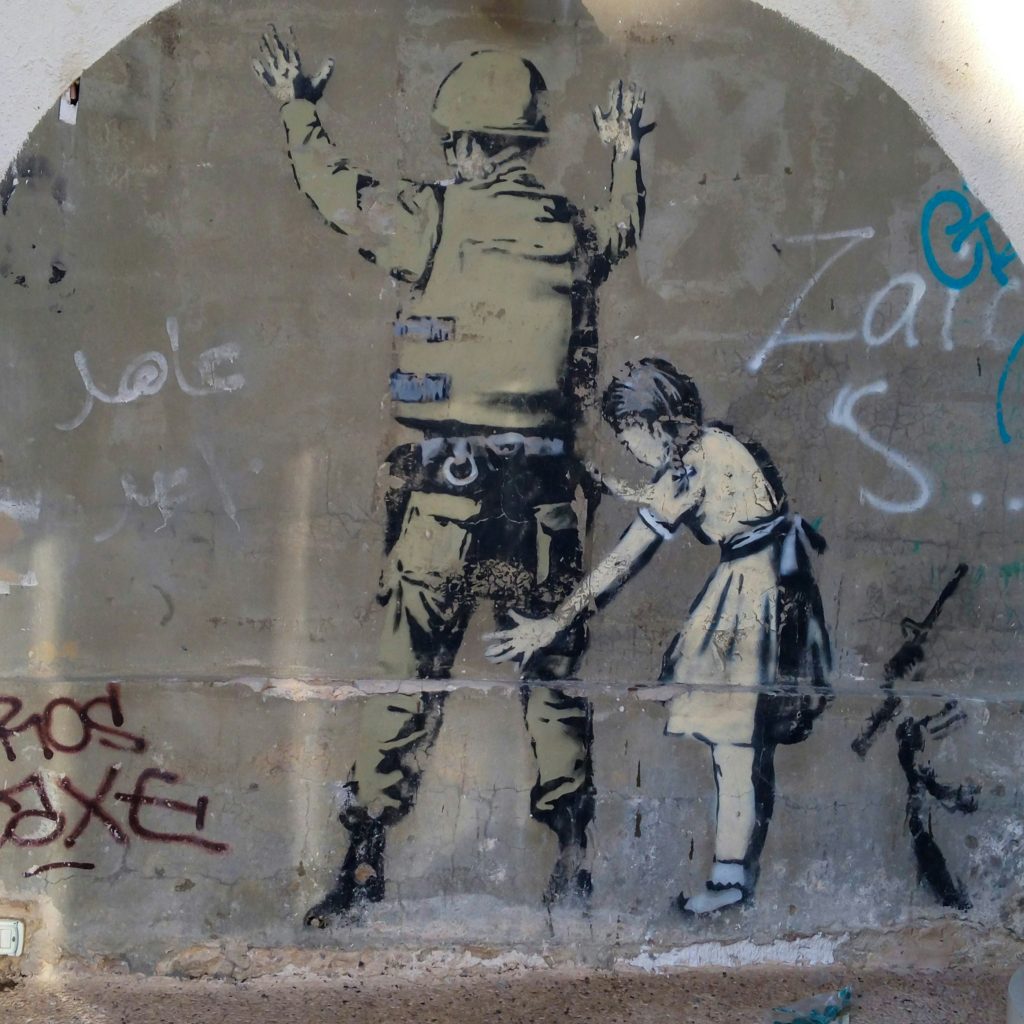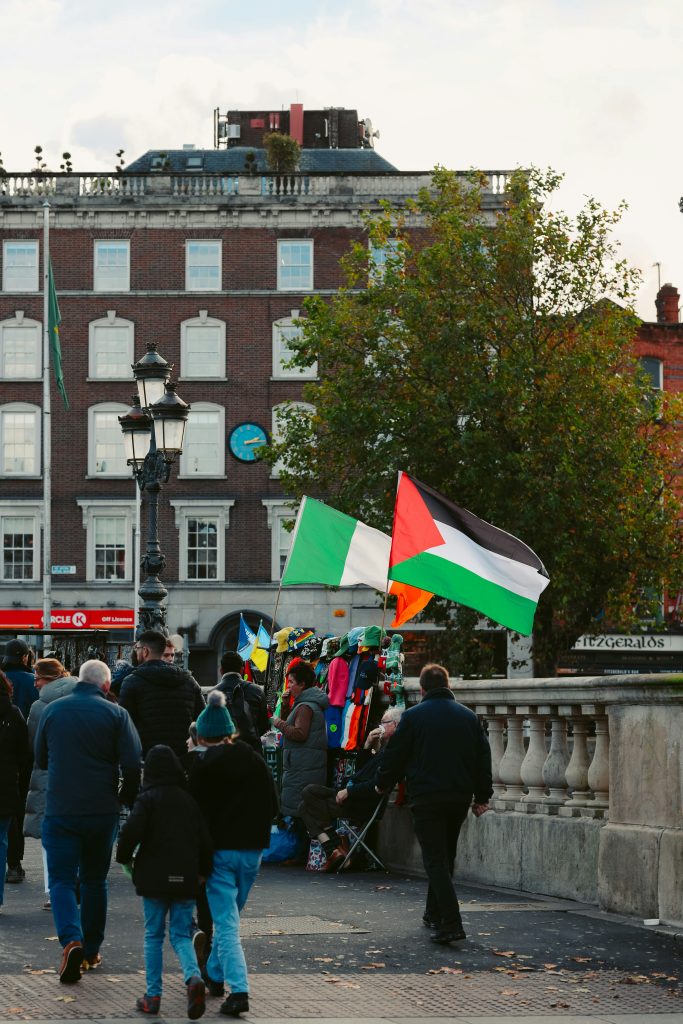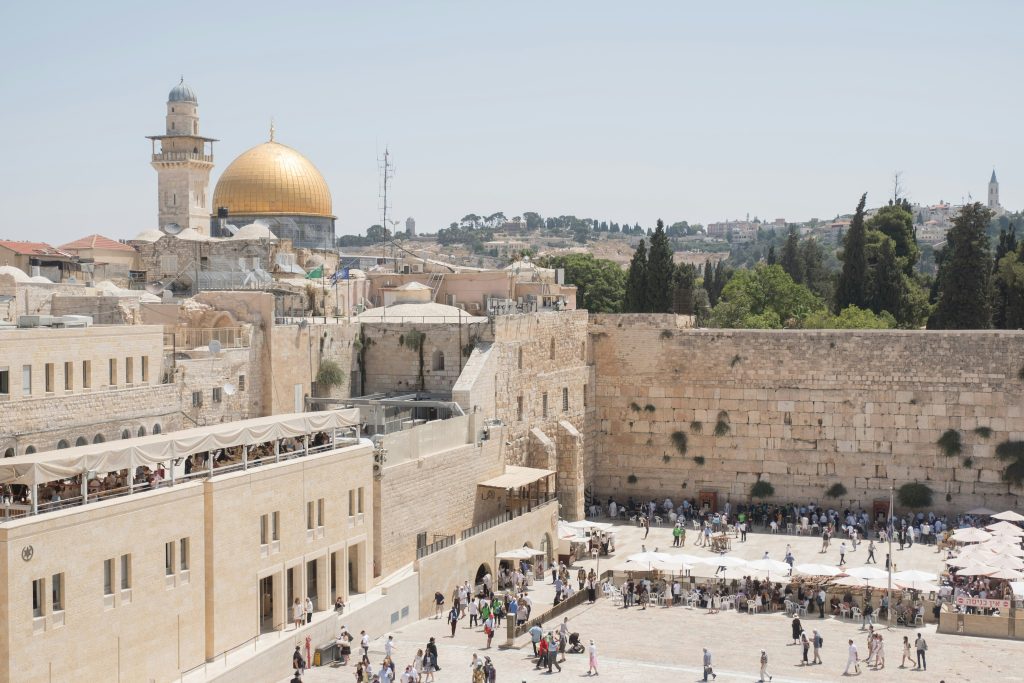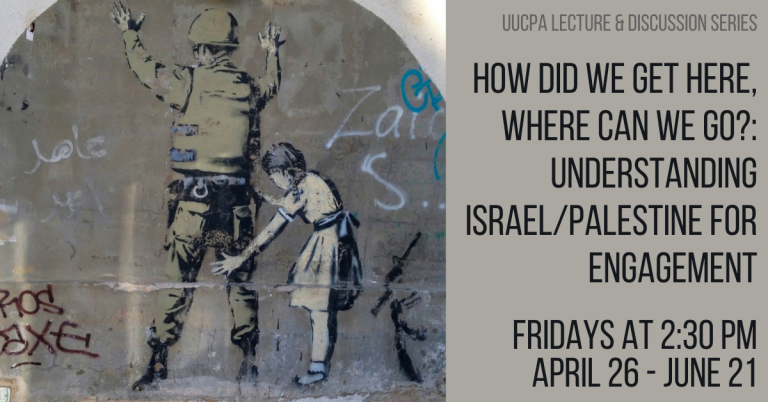Update: the last four sessions will be by Zoom only
In the recent service about talking about Israel and Palestine, I asked you to write your hopes, fears, and questions about this heartbreaking issue. Dozens of people did—almost everyone in attendance—and what I and Rev. Cat learned was that people are seeking sound knowledge about the situation. I’ve found an excellent resource, and am going to structure these classes around it.

I am glad to report that in your notes, many of you also expressed a holy impatience for action. Please do not wait for these sessions to be over in order to act! We may not yet have reached enough understanding to take action as a congregation, but you have many avenues for individual action, for example through the organizations listed here. I have not vetted all of these organizations thoroughly enough to confidently endorse them, but from what I know of them, they are responsible seekers of a just peace in which Palestinians, Israelis, and Muslims and Jews of all ethnicities and nationalities are accorded their full rights and dignity. Most or all offer their members a toolbox of well-timed and planned actions to take.
- UUs for Justice in the Middle East
- If Not Now
- J Street
- Allmep: Alliance for Middle East Peace
- Just Vision
- And for organizations based in the Occupied Territories and Israel, I recommend this list.
Onward to the class. It is structured around a four-part lecture series by Dr. Hussein Ibish and Prof. David N. Myers that was co-presented by Fordham University’s Center for Jewish Studies, Center for Religion and Culture, Department of History, International Studies Program, and Middle Eastern Studies Program.

Each time, we will watch about half of the lecture, preceding it with a recommitment to our intentions and principles, and following it with a discussion. You are free to attend only some sessions, but as always, the more consistently you participate, the more we all gain from the shared conversation. If you anticipate missing a week, I strongly recommend watching that portion of the video on your own so that you are caught up when you return.
This is emphatically not for UUCPA folks only. Anyone with a sincere commitment to an outcome that respects people’s inherent worth and dignity, and that creates peace, liberty, and justice for all, is welcome to join us. Invite your friends.
About location: When discussing difficult topics, in-person is best. However, if Zoom enables you to attend when you otherwise wouldn’t be able to, please do join via Zoom.
Session 1: Friday, April 26, 2:30 pm, Fireside Room and Zoom
We watch How Did We Get Here?: A Deep Dive into the History of Israel and Palestine Part One: 1882-1948 from 4:21 to 50:50
Session 2: Friday, May 3, 2:30 pm, Fireside Room and Zoom
We watch How Did We Get Here?: A Deep Dive into the History of Israel and Palestine Part One: 1882-1948 from 50:50 to the end.
NO SESSION MAY 10
Session 3: Friday, May 17, 2:30 pm, Zoom only
We watch How Did We Get Here? A Deep Dive into the History of Israel and Palestine Part II: 1948-1967 from the beginning to 43:12.
Session 4: Friday, May 24, 2:30 pm, Fireside Room and Zoom
We watch How DId We Get Here? A Deep Dive into the History of Israel and Palestine Part II: 1948-1967 from 43:12 to the end.
Session 5: Friday, May 31, 2:30 pm, Zoom only
We watch How Did We Get Here?: A Deep Dive into the History of Israel and Palestine, Part III: 1967-2023 from the beginning to 48:00
Session 6: Friday, June 7, 2:30 pm, Zoom only
We watch How Did We Get Here?: A Deep Dive into the History of Israel and Palestine, Part III: 1967-2023 from 48:00 to the end
Session 7: Friday, June 14, 2:30 pm, Zoom only
We watch How Did We Get Here?: A Deep Dive into Israel and Palestine, Part IV: Understanding October 7th and Its Aftermath from the beginning to 49:34
Session 8: Friday, June 21, 2:30 pm, Zoom only
We watch How Did We Get Here?: A Deep Dive into Israel and Palestine, Part IV: Understanding October 7th and Its Aftermath from 49:34 to the end.

The first three lectures (our first six sessions) were delivered at Fordham in 2017-2018. The speakers then returned last month to offer the fourth lecture (our last two sessions) as an in-depth perspective on the history of Israel-Palestine in light of the current moment. Dr. Hussein Ibish is a Senior Resident Scholar at the Arab Gulf States Institute in Washington (AGSIW). He is a weekly columnist for The National and previously served as a Senior Fellow at the American Task Force on Palestine. Prof. David N. Myers is Distinguished Professor and Sady and Ludwig Kahn Chair of Jewish History at UCLA. The author and editor of many books, he directs the UCLA Luskin Center for History and Policy and the UCLA Initiative to Study Hate.
I could not find an evening time that works for eight sessions without going deep into summer. Rev. Cat and I will get creative and try to offer such a slot, so stay tuned.
Hoping to see you there–
Amy
Photos: Graffiti art in Bethlehem, West Bank by Dan Meyers on Unsplash; Pro-Palestine protest in Paris by Ibrahim guetar on Unsplash; Western Wall and Dome of the Rock, Jerusalem by Anton Mislawsky on Unsplash

